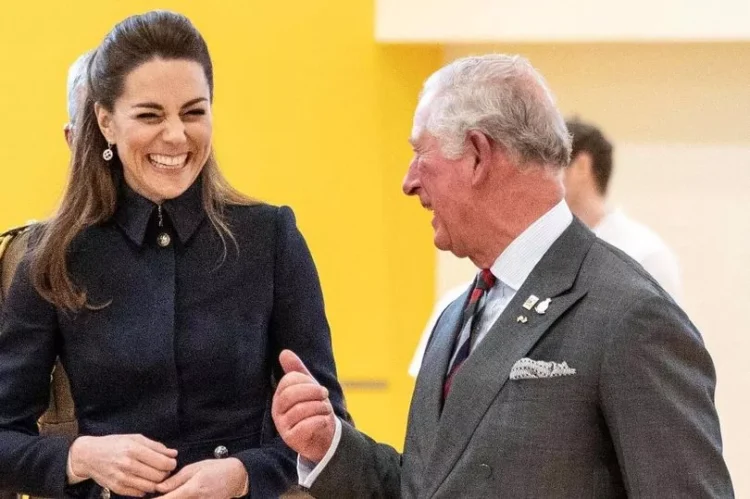By Gabriel Princewill-
The King and Princess of Wales have found themselves ensnared in a web of controversy, falsely named in the Dutch translation of Omid Scobie’s book, “Endgame.”
The Dutch translation of Omid Scobie’s book featured the names of the King and Princess of Wales in connection to the contentious allegations.
Xander Uitgevers, the Dutch publisher, promptly withdrew the book from circulation, citing an “error.” Scobie, visibly frustrated, vehemently denied submitting a manuscript that included the names of the senior royals.
Buckingham palace is said to be contemplating its response as the incident resurfaces a two-year-old saga that traces its roots back to the explosive revelations made during the Duke and Duchess of Sussex’s interview with Oprah Winfrey .
The initial impact of this controversy emerged in March 2021 when Meghan Markle, the Duchess of Sussex, unveiled startling allegations during the interview, asserting that an unnamed member of the Royal Family expressed concerns about the potential skin colour of her son, Prince Archie, before his birth.
This revelation unleashed a torrent of public outcry and prompted Buckingham Palace to swiftly dismiss the claims as mere fiction.
Despite the palace’s swift rebuttal, the allegations lingered in the collective consciousness of the British public, creating a fault line within the otherwise stoic facade of the royal family.
The Duchess’s refusal to unveil the identity of the alleged perpetrator fueled speculation, giving birth to the moniker of the “royal racist.”
The controversy took an unexpected turn in November 2021 when Page 6 published that American author Christopher Andersen explicitly pointed a finger at the King.
In his book, “Brothers And Wives: Inside The Private Lives of William, Kate, Harry, and Meghan,” Andersen claimed that King Charles made comments about the potential appearance of Harry and Meghan’s children on the day their engagement was announced in November 2017.
Buckingham Palace immediately dismissed Andersen’s account, categorizing it as fiction and unworthy of further comment. In truth, Anderson could have been sued for defamation of character if the claims are untrue and he is unable to substantiate them.
Fast forward to the present, and the ghost of this controversy has returned to haunt the monarchy.
The institution, with its deep-rooted traditions and penchant for privacy, has weathered numerous storms throughout its existence. This may prove another psychological burden, despite the withdrawal of the book from the shelves.
Royal History
The modern British monarchy, as we know it, emerged from the ashes of a tumultuous history that has seen power struggles, revolutions, and seismic shifts in societal norms.
The annals of royal history are dotted with incidents that tested the resilience of the monarchy.
The narrative of questioning the legitimacy or character of royal offspring is not unprecedented.
Throughout history, rumours and speculations have surrounded various members of the royal family, perpetuating myths and feeding the insatiable appetite of the public for scandalous narratives.
The controversy surrounding Prince Archie’s skin color allegations unfolded against the backdrop of a rapidly evolving media landscape.
Prince Harry And Meghan Markle gave bombshell interview to Oprah Winfrey in 2021 Image:ITV
In the aftermath of the Oprah interview, the royal family attempted to control the narrative. Prince William, the Duke of Cambridge, issued a rare public statement, asserting, “We are very much not a racist family.”
The palace followed up with a more measured response, acknowledging that “whilst some recollections may vary,” the concerns raised in the interview were “concerning” and would “be addressed privately.”
The recent inclusion of the King and Princess of Wales in the Dutch version of Scobie’s book adds another layer of complexity to an already intricate narrative.
An investigation will no doubt take place to ascertain the origins of this “error.” On the balance of probability, the inclusion of the senior royals in the book was a deliberate echo of Anderson’s claims in his own book.
Questions arise about the potential impact on the monarchy’s reputation and the delicate balance between public interest and private matters.
Omid Scobie, a prominent royal correspondent, has been both lauded and criticized for his coverage of the Sussexes and his involvement in the biography “Finding Freedom.”
The inclusion of this supposedly erroneous information in his latest book adds fuel to the ongoing debate about the blurred lines between journalism and advocacy.
The recent incident amplifies the risks associated with navigating this delicate balance, where a single misstep can thrust even the most private matters into the public domain.
The resolution of this controversy, the public’s response, and the palace’s chosen course of action could shape the narrative surrounding the royal family for years to come.





